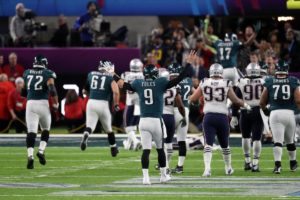 In Week 4, the Carolina Panthers came into Foxboro and embarrassed the Patriots defense. You might remember Matt Patricia on the sideline screaming at his secondary, which was blowing coverages the way Mike Tyson did his career earnings. Everyone thought the defense would send New England’s 2017 season down the toilet.
In Week 4, the Carolina Panthers came into Foxboro and embarrassed the Patriots defense. You might remember Matt Patricia on the sideline screaming at his secondary, which was blowing coverages the way Mike Tyson did his career earnings. Everyone thought the defense would send New England’s 2017 season down the toilet.
That narrative evaporated as the Patriots gave up the fewest points in the NFL after Week 5, but as it turns out, the flush was indeed initiated in that Week 4 debacle. It just took until Super Bowl 52 for the water to disappear.
“We knew they had problems when you force them to defend stacks and bunches,” said one Eagles offensive assistant after the game. “You look at early in the year, against those stacks, they were losing guys.”
What the Eagles saw, particularly in that Carolina game, was that the Patriots couldn’t figure out how to defend receivers who released together on intersected routes, especially when pre-snap motion was involved. New England righted things in Week 5 (and moving forward) by simplifying into more basic man-to-man principles—and that simplification is what Philadelphia exploited Sunday night.
The Eagles consistently created favorable angles and leverage for their receivers, and at times they even dictated favorable matchups. They got some significant help here from the Patriots, who shockingly benched starting corner Malcolm Butler. Asked when they realized Butler would not be playing, the Eagles assistant said, “After the first series or two. We were like, ‘This guy’s not in the game! They have 23 [Patrick Chung] in there. That’s crazy!’”
Butler’s absence was huge. Not only was Chung, a safety, now essentially the No. 3 corner caught in a tough slot matchup against the shiftier Nelson Agholor, but the usual slot corner, Eric Rowe, was isolated on the outside. Downgrades resonated at two positions.
The plan was “to go after 25 [Rowe],” said the assistant. “We could get Alshon [Jeffery] out there against him. We had Rowe on our team here in Philly, we knew that was a mismatch.”
But did it have to be?
“It was interesting—we thought 24 [Stephon Gilmore] would shadow Jeffery, which he did in the second half, but not in the first half. We liked our matchups across the board regardless.”
Many of Philadelphia’s wideouts said they didn’t even notice Butler’s absence. (“I ain’t really thought about,” said Jeffery. “Doesn’t matter—they’re a faceless opponent.”) Torrey Smith noticed, though. “I’m not going to lie, I probably studied [Butler] . . . ” Smith trailed off. “Well, put it like this: I definitely did not study No. 25 [Rowe]. I watched him a little bit, but I didn’t study him.”
Aside from Butler, Eagles players and coaches, to a man, said that New England did nothing they didn’t expect. Jeffery did not catch a pass in the second half after Gilmore switched over to him, but by then Nick Foles had found his rhythm. Tight end Zach Ertz was a major factor, often benefitting from Philly’s stack and bunch release designs, both as part of those groupings and as the man on the backside of them. His game-winning, 11-yard touchdown on a slant against safety Devin McCourty was the culmination of the offense dictating the terms of engagement. After seeing New England’s coverage tendencies all game, the Eagles knew they’d get a one-on-one scenario with their Pro Bowl tight end in space against McCourty. And if Ertz wasn’t open, they believe Jeffery, the primary read on the other side, would have converted.
Aided by designs like these, Foles, for the second straight game, played the game of his life against a marquee opponent and on the grandest stage of his career. Just like he did against the Vikings in the NFC title game, Foles extended plays late into the down—both in structure and, at times, out of structure.
The Patriots, with their mediocre pass rush, are easier to extend plays against than are the Vikings. With that and the man coverage getting defeated, Foles had no trouble finding his confidence.
“I think the big thing that helped me was knowing that I didn’t have to be Superman,” he said after the game. “I have amazing teammates, amazing coaches around me.”
The leader of those coaches, Pederson, aided Foles with selective bouts of aggressive play-calling. The second-year head coach outdueled New England’s sixth-year defensive coordinator.
“Obviously, I didn’t do a good enough job,” Patricia said afterwards. “Look, that is a great offense, they are extremely talented. I have been talking about it all week how good they are. They just played really well, and we didn’t get stops.”
Patricia wouldn’t say why Butler sat on defense, other than that it came down to playing certain “packages.” But, given everything Philadelphia did to exploit New England’s man coverages, it was the biggest coaching decision of the game, and one of the biggest in Super Bowl history. That Butler and the rest of the secondary didn’t know about it until moments before kickoff is mind-blowing. Afterwards, Butler said that the Patriots gave up and him, and that he “could have changed that game.” We’ll never know.
